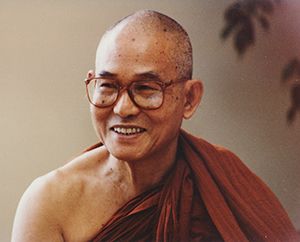Which One Would You Choose to Die?

. . . At this point (in the practice of expanding metta), conditional love unfolds into unconditional love. Here dependent love can turn to the flowering of an independent love that is not based upon getting what we want or having our expectations met. Here we learn that the inherent happiness of love is not compromised by likes and dislikes, and thus, like the sun, it can shine on everything. This love is truly boundless. It is born out of freedom, and it is offered freely.
Through the power of this practice, we cultivate an equality of loving feeling toward ourselves and all beings. There was a time in Burma when I was practicing metta intensively. I had taken about six weeks to go through all the different categories: myself, benefactor, friend, neutral person, and enemy. After I had spent these six weeks doing the metta meditation all day long, my teacher U pandita, called me into his room and said, “Suppose you were walking in the forest with your benefactor, your friend, your neutral person, and your enemy. Bandits come up and demand that you choose one person in your group to be sacrificed. Which one would you choose to die?”
I was shocked at U Pandita’s question. I sat there and looked deep into my heart, trying to find a basis from which I could choose. I saw that I could not feel any distinction between any of those people, including myself. Finally I looked at U Pandita and replied, “I couldn’t choose; everyone seems the same to me.”
U Pandita then asked, “You wouldn’t choose your enemy?” I thought for a minute and answered, “No, I couldn’t.”
Finally U Pandita asked me,”Don’t you think you should be able to sacrifice yourself to save the others?” He asked the question as if more than anything else in the world he wanted me to say, “Yes, I’d sacrifice myself.” A lot of conditioning rose up in me — an urge to please him, to be “right,” to win approval. But there was no way I could honestly say yes, so I said, “No, I can’t see any difference between myself and any of the others.” He simply nodded in response, and I left.
Later I was reading the “Visuddhi Magga,” one of the great commentarial works of Buddhist literature, which describes different meditation techniques and the experiences of practicing them. In the section on metta meditation, I came to that very question about the bandits. The answer I had given was indeed the correct one for the intensive practice of metta.
Sharon Salzberg
from Loving Kindness; The Revolutionary Art of Happiness

